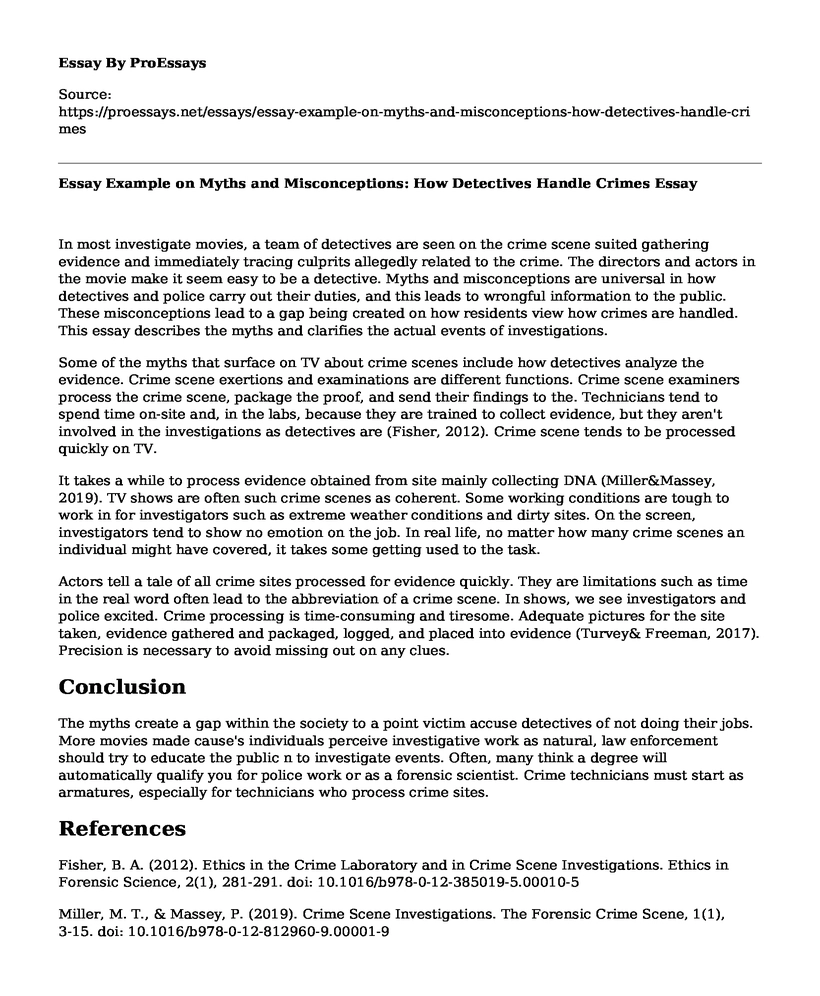In most investigate movies, a team of detectives are seen on the crime scene suited gathering evidence and immediately tracing culprits allegedly related to the crime. The directors and actors in the movie make it seem easy to be a detective. Myths and misconceptions are universal in how detectives and police carry out their duties, and this leads to wrongful information to the public. These misconceptions lead to a gap being created on how residents view how crimes are handled. This essay describes the myths and clarifies the actual events of investigations.
Some of the myths that surface on TV about crime scenes include how detectives analyze the evidence. Crime scene exertions and examinations are different functions. Crime scene examiners process the crime scene, package the proof, and send their findings to the. Technicians tend to spend time on-site and, in the labs, because they are trained to collect evidence, but they aren't involved in the investigations as detectives are (Fisher, 2012). Crime scene tends to be processed quickly on TV.
It takes a while to process evidence obtained from site mainly collecting DNA (Miller&Massey, 2019). TV shows are often such crime scenes as coherent. Some working conditions are tough to work in for investigators such as extreme weather conditions and dirty sites. On the screen, investigators tend to show no emotion on the job. In real life, no matter how many crime scenes an individual might have covered, it takes some getting used to the task.
Actors tell a tale of all crime sites processed for evidence quickly. They are limitations such as time in the real word often lead to the abbreviation of a crime scene. In shows, we see investigators and police excited. Crime processing is time-consuming and tiresome. Adequate pictures for the site taken, evidence gathered and packaged, logged, and placed into evidence (Turvey& Freeman, 2017). Precision is necessary to avoid missing out on any clues.
Conclusion
The myths create a gap within the society to a point victim accuse detectives of not doing their jobs. More movies made cause's individuals perceive investigative work as natural, law enforcement should try to educate the public n to investigate events. Often, many think a degree will automatically qualify you for police work or as a forensic scientist. Crime technicians must start as armatures, especially for technicians who process crime sites.
References
Fisher, B. A. (2012). Ethics in the Crime Laboratory and in Crime Scene Investigations. Ethics in Forensic Science, 2(1), 281-291. doi: 10.1016/b978-0-12-385019-5.00010-5
Miller, M. T., & Massey, P. (2019). Crime Scene Investigations. The Forensic Crime Scene, 1(1), 3-15. doi: 10.1016/b978-0-12-812960-9.00001-9
Turvey, B. E., & Freeman, J. (2017). Crime Scene Investigation and Analysis. Forensic Investigations, 91-123. doi: 10.1016/b978-0-12-800680-1.00005-5
Cite this page
Essay Example on Myths and Misconceptions: How Detectives Handle Crimes. (2023, Feb 12). Retrieved from https://proessays.net/essays/essay-example-on-myths-and-misconceptions-how-detectives-handle-crimes
If you are the original author of this essay and no longer wish to have it published on the ProEssays website, please click below to request its removal:
- Clinton's United Nations 4Th World Conference Speech
- Article Analysis Essay on "Panama Papers Investigation: Four Men Criminally Charged in Us." By the Guardian
- Essay Example on Death Penalty: Decline in US & Worldwide Abolition
- Bill of Rights: Protecting Human Rights and Dignity - Essay Sample
- Paper Example on Security Studies and International Relations
- Cybercrime: Autonomy, Automation & Physical Agency - Essay Sample
- Essay Example on Crime: An Overview of Recent Cases Worldwide







